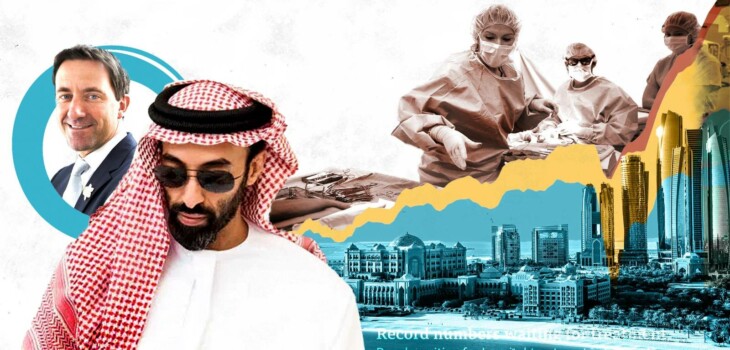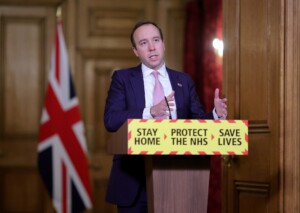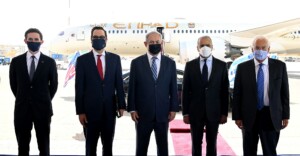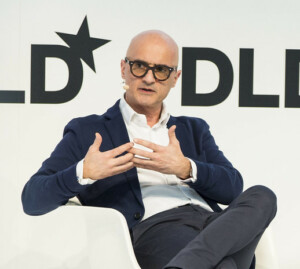Circle Health & how the world’s richest family is honing in on Britain’s private hospitals

Circle Health is the UK’s largest private hospital provider. Earlier this year, it was sold by Centene (see our recent report here) to a United Arab Emirate (UAE) healthcare firm owned by the Emirate of Abu Dhabi. In the final instalment of our Barry Amiel & Norman Melburn Trust-funded project investigating NHS privatisation, we look into a major new beneficiary of the UK’s private hospitals network: a powerful royal associated with crackdowns on dissents in the Gulf. And we uncover a few local politicians who’ve been profiting along the way.
We found:
- Circle Health is now ultimately owned by the Emirate of Abu Dhabi, via the UAEs’ sovereign wealth fund, ADQ.
- ADQ is managed by the Gulf state’s royal ‘spymaster’ – and brother of the country’s ruler – Sheikh Tahnoon bin Zayed Al Nahyan.
- Tahnoon, a member of the world’s richest family, also benefits personally from the privatisation of healthcare in the UK via his controlling interest in Royal Group.
- Besides the NHS, ADQ has also made significant inroads into the US’s private hospitals network via its subsidiary’s share in Ardent Health Services.
CIRCLE HEALTH GROUP
Circle Health Group runs the largest private hospital network in England and Wales. With over 50 hospitals, 2,000 plus beds, and 2 million patient visits yearly. It went from being a relatively modest provider, to making approximately £1bn a year in revenue after acquiring BMI. Circle’s position in the healthcare market in Britain was cemented by buying up its rivals and other providers.
In its private hospitals, Circle provides treatment for both paying customers and NHS patients. Services range from GP appointments, to surgeries, scans, and physiotherapy.
According to data from public contracts analysts, Tussell, Circle was number 10 on the top 20 NHS and Department of Health and Social Care (DHSC) suppliers list (by spend) between 2016 and the start of 2024. Tussell found that in this time, the company was awarded £1.8bn in contracts. The company paid its board a staggering total of £4.2m between 2021 and 2022.
A Vicious Circle
When it comes to NHS lore, perhaps one of the main things that Circle is known for is its catastrophic takeover of Hinchingbrooke Health Care NHS Trust in 2012. Expected to be a trailblazer in NHS hospital privatisation, Hinchingbrooke was the first hospital in the UK to be taken over by a private company. The ten-year franchise was awarded to Circle, which planned vast savings for the struggling hospital. A report at the time by the National Audit Office (NAO) showed concern about the lack of detailed plans for how the company was to meet its £311m savings goal over a ten-year period, then unprecedented for the NHS.
Just one year into managing the hospital, the company had amassed an unplanned debt of £2.2m on top of that already accrued by the Trust. By early 2015, it announced it would be pulling out of the contract entirely, leaving the health service to pick up the tab. Trade unions and government departments raised concerns about scant risk assessments made ahead of the award and questioned the seemingly unachievable savings Circle had promised. Following the withdrawal, tales of appalling care, bullying, large staff cuts, and unsafe practices came to light. Hinchingbrooke became the first hospital in the NHS to receive the CQC’s rating of ‘inadequate’ for care.
Since then, the company has continued to be awarded NHS contracts to treat public patients and run treatment centres, with its latest accounts showing revenue over £300m a year in both 2022 and 2021 for this area of work, approximately a third of its income stream on average.
With new awards, come new tales of NHS privatisation fallout, another example of which can be seen in 2014 in Nottingham. Following the disastrous takeover of dermatology services at Nottingham Trust by Circle, specialist doctors decided to leave rather than have their work transferred to the company. The facility collapsed and put other NHS services under financial strain when they had to pick up the burden. In 2019, Circle lost the contract in a win for anti-privatisation campaigners and NHS patients, but not without a court case being brought against the health service in Circle’s attempt to save its profits.
The Inner Circle: who benefits?
Like most healthcare companies reaping rewards from the NHS, Circle has many links to people in positions of power.
Circle was co-founded in 2004 by Ali Parsa – a man who said he ‘could do better than the NHS’. He stepped down in 2012, one year into the failing contract with Hinchingbrooke – but not before receiving a £1.1m pay cheque. He then went on to set up the infamously dysfunctional GP at Hand app, with his new company Babylon Health. Babylon won several contracts with the NHS, all of which ran into difficulty.
It’s unclear why the NHS kept pumping money into Parsa’s projects, but we do know that Boris Johnson’s senior advisor, Dominic Cummings, was hired as a consultant by Babylon in 2018, in what some MPs speculated was a conflict of interest. Matt Hancock was known for publicly backing the GP app and reportedly received donations from Babylon shareholders — all while acting as health secretary.

Matt Hancock received donations from Babylon shareholders
At least 14 members of the House of Lords have, at various times, declared interests in Circle itself. Labour peer and former health minister, Lord Hutton of Furness, acted as company director until May 2024, while former Tory MP Mark Simmonds previously worked as a strategic adviser at the firm. The wife of Neil O’Brien, a recent Tory health minister and MP for Harborough, Oadby and Wigston, currently acts as GP engagement lead for Circle.
Circle is led by CEO Paolo Pieri, the former PriceWaterhouseCoopers (PwC) accountant who joined the health company in 2010. He held the role of Chief Finance Officer and was in charge of balancing the books during the takeover of Hinchingbrooke. In 2013, two years before the contract collapsed, Pieri spoke with pride about his management strategy, implying that the hospital’s dozens of managerial nurses could be dispensed with. He attributed his learning in part to his years spent in Silicon Valley.
But these are all small fry compared to Circle’s new owners: PureHealth, and the Gulf state royals who stand to benefit.
World’s richest family carving up our health service
In early 2024, Circle was bought by PureHealth Holdings, the UAE’s biggest ‘integrated healthcare’ system, whose largest shareholder (at around 40%) is the country’s sovereign wealth fund, ADQ. This ‘integrated’ system includes running hospitals, health insurance, health tech, diagnostics, pharmacies, and even procurement.
ADQ (officially: Abu Dhabi Developmental Holding Company PJSC), is in turn owned by the Emirate of Abu Dhabi, and has assets worth $196.1bn (£153.5bn). As a monarchy, the UAE’s sovereign wealth funds are controlled by the ruling Al Nayan family. The family’s complex network of assets have made them extraordinarily rich; last year the Al Nayans’ wealth reportedly surpassed that of the Walton family, who own Walmart, making it the world’s wealthiest dynasty.
ADQ’s chair is the ruler’s brother, Sheikh Tahnoon bin Zayed Al Nahyan, who has been described as a key person in the management of the family’s finances. Besides his leadership at ADQ, Tahnoon chairs the world’s second largest sovereign wealth fund, the Abu Dhabi Investment Authority. He also chairs the UAE’s largest lender, First Abu Dhabi Bank, and has appeared in the Pandora Papers.
According to the latest company report, PureHealth’s other top shareholders – with a combined stake of approximately 30% – are Alpha Dhabi Holding, and International Holding Company (IHC). Financial databases suggest that both of these are owned by Royal Group, a UAE firm controlled by Tahnoon. In addition to his influence as chair of ADQ, Tahnoon therefore has an enormous personal stake in PureHealth — and by extension its subsdiary, Circle Health.
Set up in 1998 to diversify the country’s business sectors beyond oil, IHC is one of the most valuable companies listed in the Middle East and Tahnoon is also chair of that firm. IHC owns an extensive range of companies which span healthcare, police, military, entertainment, infrastructure, real estate, finance, energy and tech, and as of October 2024, the UAE holding company was rated bigger than McDonalds by market capitalisation. It does this mainly by acquiring these businesses from the Royal Group. The holding company also invests globally, and financed Oxford-based DNA sequencing firm, Nanopore Technologies with a whopping £39m in 2020. Incidentally, Nanopore is also currently funded by Oracle boss, Larry Ellison (see our recent profile on Oracle here), and is rolling out pilots across the NHS.
What is IHC?
Known as the UAE’s ‘spymaster’ for his official role as special advisor on national security, Tahnoon is seen as central to the country’s cyberwarfare strategy towards other states, including spying on citizens of foreign countries who are critical of the UAE’s human rights. In 2013, he was appointed as deputy national security advisor of the UAE, a move that marked the start of his journey to spymaster. The Emirate ran its cyber intelligence programme, Project Raven under Tahnoon’s tenure. This was a hacking operation, infamous for its use of former US National Security Agency (NSA) veterans. Project Raven saw countless individuals and groups secretly put under state surveillance, including government critics. One target was UK journalist and human rights activist, Rori Donaghy, whose phone was infected with spyware.
Tahnoon is thought to be aligning UAE and Israeli intelligence services following a meeting with Mossad head, Yossi Cohen, soon after the countries reconciled relations in 2020 after decades of tension and mistrust. He is also the owner and chair of cloud computing and artificial intelligence (AI) company G42, which was the first UAE firm to open in Israel after the agreement.

A UAE delegation arrives in Israel in October 2020 on a historic visit to participate in the signing ceremony of four agreements relating to investment, scientific cooperation, civil aviation and visa exemptions as part of the Abraham Accords. Photo credit: Matty Stern
Tahnoon stands to benefit astronomically from the chronic underfunding of the NHS and the resulting growth of the UK private hospital market, profits which will no doubt be used to pay for more superyachts, palaces, and central London properties. The move on healthcare is nothing new for the Gulf royal, and his intricate network of corporate and state actors: when PureHealth invested $500m (£382m) into Ardent Health Services in late 2022, it gained a considerable stake in the one of the largest private acute hospital providers in the US and became the first UAE-based health company to acquire US hospitals and clinics. This move gave the UAE access to 30 hospitals and 200 healthcare sites across the country, which begs the question – what interest does the UAE’s royal ‘spymaster’ have in British and American healthcare?
Encircling the NHS
The world’s richest family now has a major stake in the expansion of the UK’s private hospital market. Not only that, but in a sign of just how unregulated the market has become, a company managed by the spy chief of an authoritarian state will be allowed to get close to sensitive NHS data. What could go wrong?
With private sector fan Wes Streeting now in charge of ‘fixing’ our broken NHS, we can be sure to see a continuation of the kind of privatisation that’s been ravaging the health service in the first place. We increasingly see practices which prioritise private profit over public benefit in the sector, such as the rise of private equity involvement, and the kind of ‘horse-trading’ we have highlighted here. It’s clear that to achieve meaningful and lasting change, it’s more effective to join your local campaign group than hedge your bets on the new government

